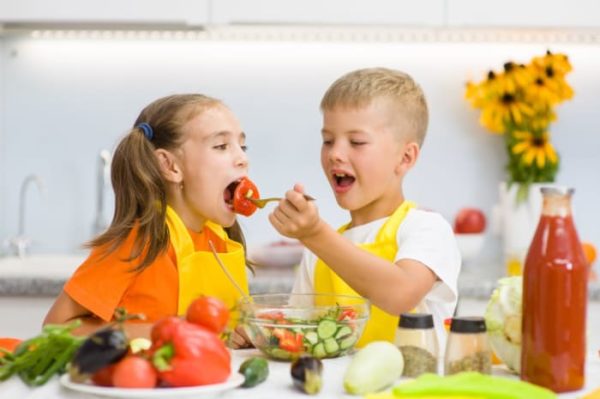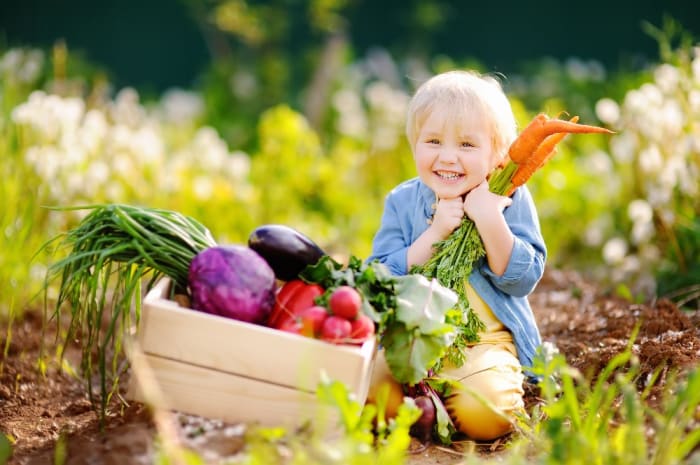

Health experts maintain that a well-planned vegan diet can be healthy for children (Photo: Adobe. Do not use without permission)
A host of leading doctors have criticized a report by The Royal Academy of Medicine of Belgium which claims that veganism is ‘unsuitable for unborn children, children, teenagers, and pregnant and lactating women’.
The medical experts have written an open letter to Georges Casimir, one of the professors behind the report, who argues that vegan parenting now qualifies as ‘non-assistance to a person in danger’ – a criminal offense that carries a prison sentence of up to two years.
The open letter was written by Miriam Martinez-Biarge, Consultant Paediatritian on behalf of Plant-based health professionals UK.
Open letter
Dear Professor Casimir,
We are writing to you regarding your report Régimes végétariens et végétaliens administrés aux enfants et adolescents, and the press release that was published on 14th May 2019.
We are very worried about the conclusions of your report and how they have been reported in the media. We understand your concerns about the health of vegan children. We agree with you that it is important to support vegan parents and not judge them. However we have seen these days headlines calling for vegan parents to be arrested or prosecuted. (1,2)
Criminalizing vegan parents may lead to them not telling their doctors that they are vegan, missing the opportunity to receive adequate nutritional advice. In extreme cases, if parents feel judged and harassed, they might stop attending medical appointments, which could have adverse consequences on their child’s health. In most of the published case reports on adverse effects of vegan diets in children, the common denominator and the main cause of the health problems was the lack of medical care the child was receiving and not the vegan diet itself.
The position of the most important dietetic associations is that a well-planned vegan diet is perfectly adequate for individuals of all ages, including infants, children and adolescents and during pregnancy and breastfeeding, and may provide health benefits for the prevention and treatment of chronic diseases. (3-5)
We have been counselling vegan parents for many years and we can say confidently that vegan children are healthy and thriving, and that educating vegan parents on how to plan well-balanced diets for their children is feasible and easy.

The Belgian report looked at criminalizing parents of vegan children (Photo: Adobe. Do not use without permission)
‘Nutritional imbalance’
You say in your report that vegan diets systematically lead to nutritional imbalance and deficits, particularly in essential amino acids, vitamin B12, vitamin D, calcium, iron, zinc, iodine and DHA. However you do not provide any reference showing that vegan diets in children lead to nutritional deficiencies more often than non-vegan diets and we have not found studies supporting your statement.
It is very likely that the diets of some vegan children are suboptimal. But the same could be said of non-vegan children. According to some observational studies in Europe, vitaminD, calcium, iron, zinc, and iodine are the most commonly seen deficiencies in non-vegan children. Non-vegan diets in childhood are usually deficient in other important micro and macronutrients as well, like folate, vitamin E and fiber. (6-8)
All the nutrients you mention, except vitamin B12 and vitamin D, can be obtained from plant foods. Vitamin D can be obtained from sunlight, natural foods, fortified foods or supplements. (9)
In the absence of adequate sun exposure most children and adults will need supplements regardless of their diet; in one of the studies referenced above, less than three percent of European two-eight years children had adequate intakes of vitamin D.(6)
Vitamin B12 is synthetized by microorganisms and can be found in fortified foods and as supplements.(10) Oral supplements are cheap, easy to obtain and can be taken just once a week. Children and adults who take B12 supplements regularly have normal blood levels and do not show signs of deficiency. (11,12)
‘Planning is essential’
You also say that planning is essential for a vegan diet to be well-balanced, and we agree. However this isnot specific of vegan diets: all dietary patterns, especially during childhood, should be planned carefully. Official dietary guidelines are designed to help citizens (vegans and non-vegans) to get all the essential nutrients they needand to reduce the risk of chronic health problems.(13,14)
A well-planned vegan diet has been shown to provide at least 90 percent of the Dietary Reference Intakes of protein, iron, zinc, calcium, and n-3 fatty acids for children from one to 18 years. (15)
The report states that vegan children require systematic supplementation and mandatory clinical assessments and blood tests, which makes vegan diets more a ‘medical treatment’ than a lifestyle, and thus unethical for children. All children must have regular reviews with their general doctors and/or pediatricians to monitor their growth, health and development; this is not just for vegan children.
There is no evidence showing that vegan children that are growing and developing well and eating a well-balanced vegan diet supplemented with vitamin B12 need more medical investigations than other children. Taking a daily or weekly oral supplement of vitamin B12 cannot be seen as a form of medical treatment. Many non-vegan children take supplements regularly and many countries recommend babies and children are given supplements containing one or more vitamins. (16)
In summary, none of the arguments you provide to discourage vegan diets in children is supported by scientific evidence and clinical experience. Vegan parents need up-to-date nutritional advice and support from their health care providers, as any other parents. We believe that the best way to ensure vegan children are healthy is educating parents and health professionals in planning well-balanced diets. We would be very grateful if you considered our arguments and modified the Académie de Medécine’s position statement on vegan diets.
References:
1. https://www.telegraph.co.uk/news/2019/05/16/parents-raise-children-vegans-should-prosecuted-say-belgian/
2. https://www.thesun.co.uk/news/9098511/vegan-parents-kids-diet-prosecuted-belgium/
3. Melina V,Craig W, Levin S. Position of the Academy of Nutrition and Dietetics:Vegetarian Diets. J Acad Nutr Diet. 2016;116:1970-1980. Available at:https://www.eatrightpro.org/practice/position-and-practice-papers/position-papers/vegetarian-diets
4. https://www.bda.uk.com/news/view?id=179
5. https://www.dietitians.ca/Downloads/Factsheets/Guidlines-for-Vegans.aspx
6. Zaragoza-JordanaM, Closa-Monasterolo R, Luque V, Ferré N, Grote V, Koletzko B, Pawellek I,Verduci E, ReDionigi A, Socha J, Stolarczyk A, Poncelet P, Rousseaux D,Escribano J; Childhood Obesity Project Group. Micronutrient intake adequacy inchildren from birth to 8 years. Data from the Childhood Obesity Project. ClinNutr 2018;37:630-637.
7. Kaganov B,Caroli M, Mazur A, Singhal A, Vania A. Suboptimal micronutrient intakeamong children in Europe. Nutrients 2015; 7: 3524-3535.
8. Stephen A,Champ M, Cloran S, Fleith M, Van Lieshout L, Mejborn H, Burley V. Dietary fibrein Europe: Current state of knowledge on definitions, sources, recommendations,intakes and relationships to health. Nutrition Research Reviews 2017;30:149-190.
9. https://ods.od.nih.gov/factsheets/VitaminD-HealthProfessional/
10. https://ods.od.nih.gov/factsheets/VitaminB12-HealthProfessional/
11. SandersTA, Purves R. An anthropometric and dietary assessment of the nutritionalstatus of vegan preschool children. J Hum Nutr 1981;35:349-57.
12. Pawlak R,Vos P, Shahab-Ferdows S, Hampel D, Allen LH, Perrin MT. Vitamin B-12 content inbreast milk of vegan, vegetarian, and nonvegetarian lactating women in theUnited States. Am J Clin Nutr. 2018;108:525-531.
13. https://www.hsph.harvard.edu/nutritionsource/healthy-eating-plate/
14. https://food-guide.canada.ca/en/
15. Menal-PueyS, Martinez-Biarge M, Marques-Lopes I. Developing a Food Exchange System forMeal Planning in Vegan Children and Adolescents. Nutrients. 2018 Dec 25;11(1).pii: E43.
16. https://www.nhs.uk/conditions/pregnancy-and-baby/vitamins-for-children/?
Signatures:
Dr. Miriam Martinez-Biarge(Consultant Paediatrician)
Dr. Shireen Kassam (ConsultantHaematologist)
Dr. David Jenkins (Professor of Nutritional Sciences)
Dr. Leila Dehghan (Clinical and Public Health Nutrition)
Dr. Maria E. Theodorou, MD PhD FRCPC
Dr. Zahra Kassam MBBS, MSc, FRCR, (Radiation Oncologist)
Dr. Peter Mills Ellis (Neurosurgeon)
Dr. Jennifer Purdy, CD, MD, CCFP, DipABLM
Lauren McNeill, RD, MPH (Registered Dietitian, Masters ofPublic Health)
Dr Areli K Cuevas-Ocampo (Consultant Neuropathologist)
Dr Gloria Barone (Consultant Medical Oncologist)
Dr Giuditta Sanna
Dr Dev Priya Singhivi (SpR Paediatrics)
Dr. Katharine Cartwright (Infectious Diseases Consultant)
Dr. Rebecca EllenJones (GP)
Dr. Yoginee Gokool (Specialty Doctor,Obstetrics/Gynaecology)
Dr. Hannah Short (Menopause and PMS specialist)
Dr. Ana Alcalde(Paediatric Endocrinologist)
Dr. FranciscoDavid Muñoz Araújo, (GP)
Louisa Aubry Khwaja (Parkinson’s Nurse Specialist)
Alicja Baczynska (SpR Geriatric Medicine)
Dr. Jordi Sabate Villaret (GP)
Jenny Fernandez (Physiotherapist)
Elena Holmes MS (Registered Nutritional Therapist/RegisteredNutritionist)
Dr. Roghieh Dehghan-Zaklaki, MD, MRCGP